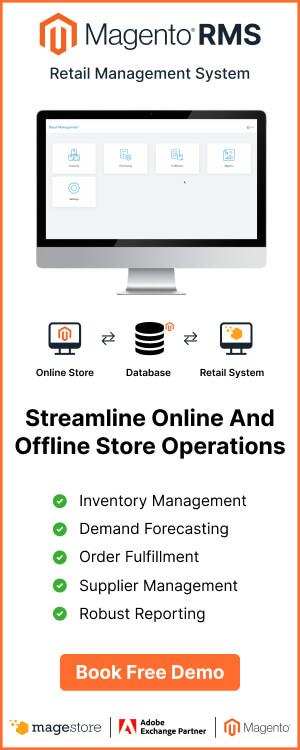According to Built With Trend, there are approximately 130,000 live Magento sites and over 500,000 websites used to use Magento. Magento might be only one of many other eCommerce platform options for starting up an online store, but these numbers reveal Magento’s position in the eCommerce market now. If you are looking for a functional eCommerce platform, Magento eCommerce is a good option for you to consider. So what is Magento and why should you use it? This article will cover all the information you need to know about Magento including its definition, versions and editions, benefits and drawbacks.
What is Magento?
Magento (Adobe Commerce) is a platform with built-in PHP, which helps programmers create eCommerce websites to sell online. It was released on March 31, 2008, by Varien and developed on Zend Framework. Magento is one of the well-known eCommerce websites where retailers can build an online store and deliver their customers online shopping experiences. It works similarly to WooCommerce, Shopify, Wix, BigCommerce, etc.
Up to this time, there are hundreds of thousands of businesses using this open-source to start their online store including big ones like Nike, Samsung, etc.
In 2018, Adobe acquired Magento with a price of $1.68 billion to complete its commerce loop. This acquisition will also help Magento develop in the enterprise market.

Magento has been listed as 1 of 10 leading eCommerce platforms for 2021 worldwide by Techliance.

What is Magento 2?
Magento 2 is the latest version of Magento Adobe, an updated version of Magento 1 with significant improvements in features. If you’re looking for a faster, safer, scalable website for your online stores, Magento 2 is the way to go with the following pros:
- Versatile website architecture
- Enhanced customer experiences
- Enhanced payment security
- Streamlined business processes
- 50% quicker load times
- Simplified maintenance and upgrades
What are Magento editions?
3 editions of the Magento eCommerce platform are Magento Commerce, Magento Open Source, and Magento Commerce Cloud, each designed to cater to different business needs.
Magento Open Source (formerly Magento Community) is a free and open-source platform to download and use. Magento Commerce (formerly Magento Enterprise) is a paid subscription eCommerce platform. It has various advanced functionalities and additional security features and updates.
While Magento Open Source is suitable for small to medium-sized businesses with high customization demands, Magento Commerce is an ideal choice for larger enterprises with support and scalability demands. That’s the reason why many businesses with in-house developers will prefer Magento open source, in contrast, those without a development team prefer Magento development agency.
Magento Commerce Cloud is a managed and cloud-based version of Magento Commerce. It includes features of Magento Commerce but has additional features of scalability, performance, and maintenance.
What are features of Magento Adobe?
For businesses and individuals who want to develop a long-term professional eCommerce site, you should think of Magento as a priority. Magento is the best open-source platform for building an online store. But the vital thing is it’s very professional and totally free.
You just need to understand a little English and technology is absolutely able to build yourself a “monumental” site with this open source.
Magento feature lists
| Magento general feature list | Magento Enterprise exclusive features |
|---|---|
| Marketing, promotions and conversion tools | Customer segmentation, targeted promotions & merchandising |
| Site management | Dynamic rule-based product relations |
| SEO | Customer segmentation, targeted promotions & merchandising |
| Catalog management | Persistent shopping |
| Product browsing | Automated email marketing reminder |
| Catalog browsing | Private sales |
| Checkout, payment and shipping | Gift registry |
| Order management | Gifting options |
| Customer accounts | Rewards points |
| Customer service | Store credits |
| International support | Multiple wish lists |
| Mobile Commerce | Add to cart by SKU |
| Analytics and reporting | Return management authorization (RMA) |
| Content management system (CMS) | |
| Scheduled import/export functionality | |
| Backup and rollback | |
| Staging, merging and rollback of content | |
| Customer attribute management | |
| Price and promotion permission | |
| Logging of administrator actions | |
| Category view and purchase permissions per customer group (limited catalog access) | |
| Order archiving | |
| Solr search | |
| Full page caching | |
| Configurable order tracking widget | |
| Support for Alternate Media Storage – CDN and Database | |
| PA-DSS Certification/payment bridge | |
| Strong data encryption, hashing and key management |
Magento basic features explained
- Product management: with many images, optional comment reviews on products, a favorites list, and inventory.
- Category management: easy to find and select products by category
- Inventory management: management of products left in stock, import, export …
- Client account: account status, transaction history, preferred catalog, address, shopping cart …
- Customer service: enhance the features, customer contact form; comprehensive follow-up, and email service.
- Order Management: create, view, edit, and fulfill orders from the admin panel
- Checkout and shipping: One-page checkout, saved shopping cart with tax and shipping estimate; shipping to multiple addresses for an order
- Payments: Many payment methods such as credit card, PayPal, Authorize.net, Google Checkout, support for external payment modules like CyberSource, ePay, eWAY, and more.
- Search technology: fast, friendly, supports search on Google Sitemap
- International support: multi-lingual and monetary
- Promotional and marketing tools: coupons, promotions, and more.
- Analyze and report: integrate with the Google Analytics service and provide multiple reports.
Omnichannel is the future of retail, so a lot of merchants select Magento eCommerce for their website, and then use Magento POS for their brick-and-mortar stores. Thanks to that, they can sell and manage their business from a centralized system.
Related post: 7 top Magento (Adobe Commerce) payment gateways in 2023
Why use Magento?
According to LitExtension’s in-house data, in 2020, Magento was one of the three platforms that merchants migrated to the most, while only a minority of store owners chose other carts. There must be many reasons why many sellers are migrating other eCommerce websites to Magento. These are the highlights that make Magento outperform other eCommerce platforms.

Open source – Highly customization
Magento not only offers flexible, scalable eCommerce solutions but also gives you the flexibility to customize. Also, it provides you the possibility to extend your platform to create unique and differentiated branded experiences. This platform can adapt well to change and has the potential to be modified to meet the requirements of shop owners.
Freedom to choose the hosting services
With Magento, eCommerce retailers can freely select the hosted platform of their choice without sticking with one hosting anymore. This provides great freedom for all online shopping businesses to have their own files and be selective with different Magento hosting companies.
Responsive mobile
Magento is good for keeping the standards of mobile web design. Both the free community edition and the enterprise version of Magento incorporate the HTML5 platform to maximize the mobile shopping experience. Consequently, your eCommerce store will always be optimized.
Magento mobile app will establish a fulfilling brand experience for consumers using their smartphones and mobile devices to connect anytime and anywhere.
Easy multi-platform integration
You can easily integrate third-party add-ons and modules into your Magento store.
This provider allows any modification without any restriction. The platform also allows shop owners to add Google Analytics and other such third-party integrations (like eBay, Paypal, Mail Chimp, etc.) to their site to aid in data analysis.
Your job is just to find out the best gadgets and “plug” in your store right away!
Expanding on Magento’s versatility, integrating it with accounting, shipping, and ERP systems enhances your e-commerce operation. This seamless integration streamlines financial processes, optimizes inventory management, and boosts overall efficiency.
🔓 Here at Magestore, our POS and RMS capitalize on this smooth integration, ensuring a comprehensive data sync across the entire business.
Increase website speed
Referring to page loading time, Magento is again the winner!
Actually, Magento has made a mission to make the fastest eCommerce stores in the world and it’s known for its power to produce a fast-loading web page as well.
And you probably already know that slow-loading pages will “sink” very fast. In many cases, the loss from the slow-loading page can be seen immediately, which sometimes leads to unintended consequences.
Magento can surprise you with the performance of the platform itself due to the ability to customize as well as the trust it brings. Utilizing a PWA storefront can speed up your website even further and delight your customers.
SEO friendly
Magento is an SEO-friendly content management system – Magento SEO. It contains lots of SEO features like:
- Search friendly URLs
- Sitemaps
- Layered navigation
- Product Title
- Keywords
- Meta tags
- Meta descriptions
In regards to SEO, Magento eCommerce is up to date with the latest SEO ranking factors. It provides great URL structure and meta-implementation options required for SEO. Magento Adobe Commerce also includes analytics for tracking web visitors. This is one of the most prominent features of Magento.
With more than 11 years of experience in Magento and hundreds of large and small projects, we’re confident that Magento is the perfect eCommerce solution for any business of any size.
Summarize pros & cons of Adobe Commerce
Every eCommerce platform has its benefits and drawbacks, Adobe Magento is an open case. However, understanding the pros and cons of each platform enables you to make the right decision when building your online website. Let’s take a glance at the following comparison table:
Pros | Cons |
Customization & Scalability (up to 1,000,000 SKUs) | High maintenance cost |
Advanced SEO options | Steep learning curve |
Easy third-party integration | Need for powerful hosting (VPS, cloud, or dedicated servers only) |
Mobile friendly | |
Magento Community with professionals | |
Advanced security | |
Convenient one-stop store | |
Intelligent product filter | |
User-friendly CMS | |
Client-based catalogs management | |
Numerous extensions and plugins |
See more about Adobe Magento pricing
How does Magestore help Magento businesses?
Magestore has worked on Magento solutions for over 12 years, from Magento extensions to Magento solutions such as Magento POS and Retail Management Software. At Magestore, we have Magento experts who can develop state-of-the-art and high-security solutions for retail businesses at all scales.
If you choose a Magento website to sell online, Magestore can help connect online and offline stores and eliminate headaches in managing the whole store operations. Magestore POS is a Magento-native point of sale with inventory management. Whatever how many physical stores or websites you have, Magestore POS can ensure real-time data synchronization of orders, sales, products, customers, and inventory. Start a unified commerce experience to improve efficiency, enhance customer satisfaction, and drive growth today!

FAQs
What is Adobe Commerce?
Adobe Commerce is merely another name for Magento. Since Adobe’s acquisition of Magento, this name has become more popular.
What is an extension in Magento?
Magento extension, according to Adobe Developer’s guide, is a group of language packs, custom modules, or a combination of two added to your Magento website for specific functionality such as payment, shipping method, abandoned cart email, etc. You can buy Magento extensions at Magento marketplace that works as Amazon, Etsy, eBay, etc.
What is Magento software?
Magento software are Magento-tailored solution with a group of features to help merchants manage store operations. Magestore POS software for Magento is an example of Magento software. When purchasing a Magento solution you need to ensure it‘s an updated solution that works with the latest version of Magento.
Is Magento same as Shopify?
No. Both Magento and Shopify are eCommerce platforms enabling entrepreneurs to build and sell products online. However, while Shopify is popular, easy to use, and affordable, Adobe Commerce Magento is complex with many advanced features and robust customization.
What is Magento CMS?
Magento is also considered a content management system (CMS) because it has content management functionalities such as page builder, content staging and review, SEO and metadata, static blocks and widgets, blog integration, etc. It’s a powerful tool for eCommerce businesses to manage content and sell products online.
Is Magento free or paid?
Magento comes with both free and paid versions. Magento Open Source is free to download and use. 2 other paid versions are Magento Commerce and Magento Commerce Cloud. Magento Cloud is more expensive due to cloud hosting services.

















Magento is one of the best E-commerce platforms built on open-source technology. Thanks for sharing the informative article.
Great job. Incredible information I found in this blog. Thanks for sharing this really great blog.
Magento is best suitable for B2B functionalities and in Magento 2.4.3 is release there is upgraded b2b module added.
Yes, Magento is getting evolved day-by-day and enhancing its quality of performance to keep up with the industry standards. Magento has brought a lot of enhanced and advanced features.
Magento saves us time and provides a great framework to utilize.
The article is a concise and informative introduction to the Magento platform. It provides a clear explanation of the features and benefits of Magento for e-commerce businesses, including its flexibility, scalability, and extensive customization options. The article is well-organized and easy to follow, making it a useful resource for anyone interested in learning more about Magento. Overall, the article effectively highlights the strengths of the platform and is a great starting point for those looking to dive into the world of e-commerce using Magento.Nice information.
Great blog post! It provides a clear and concise explanation of what Magento ecommerce is and highlights its significance for businesses. Keep up the excellent work!
Thanks for sharing this post about Magento. I like all the points you have mentioned with effective images. I am happy 🙂 for myself and the visitors for sharing this post.